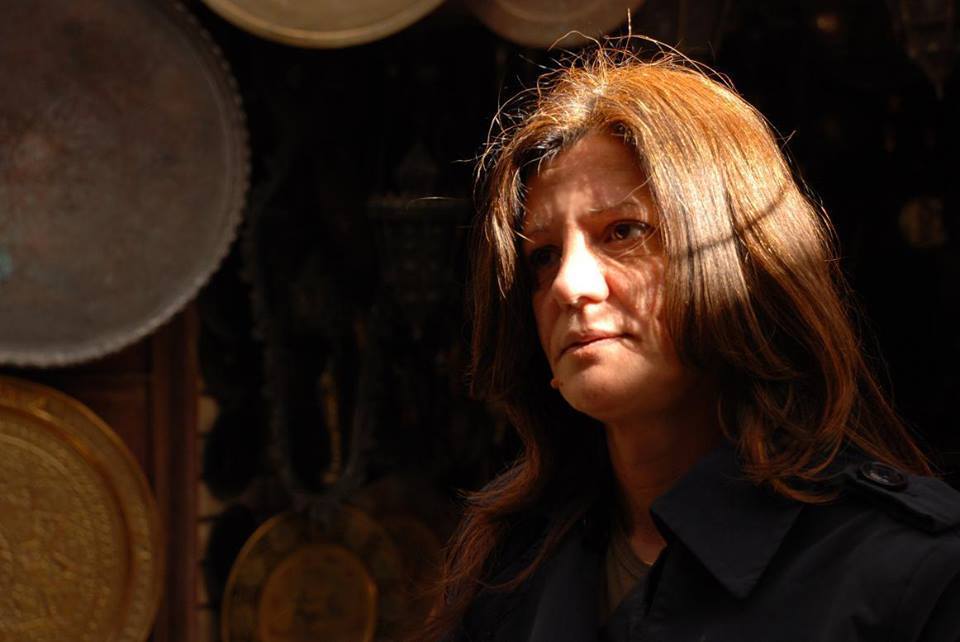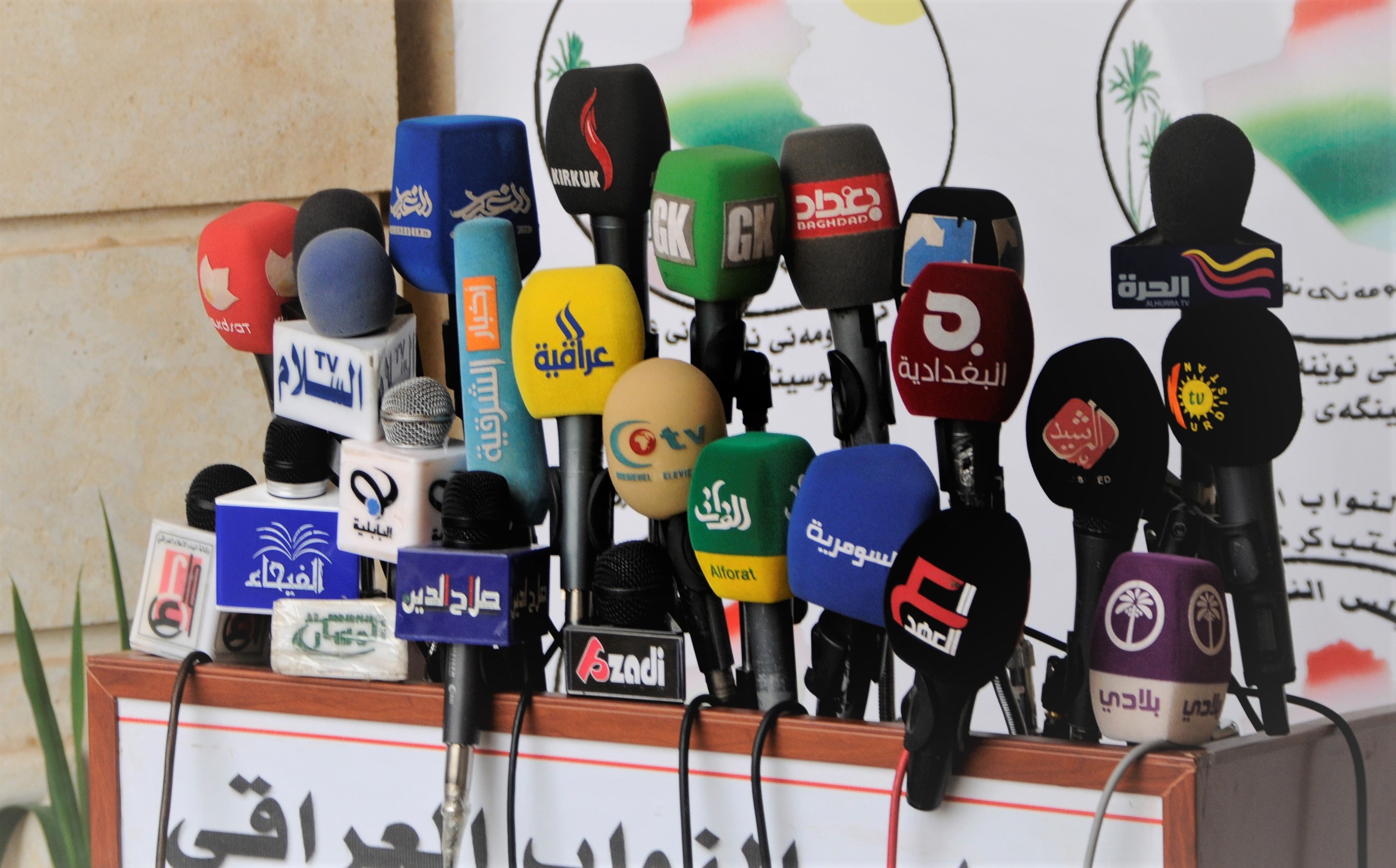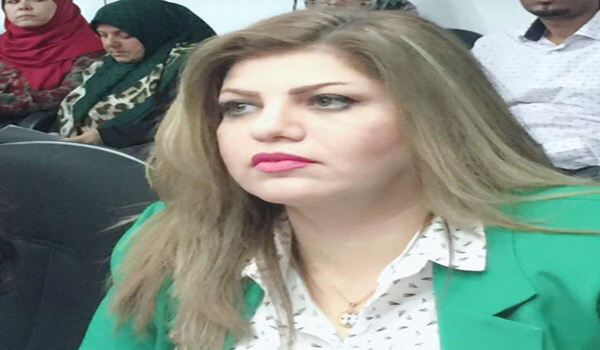Suha, 35, was desperate to find a job to make a living. She actively sought for a position that is relevant to her major in communications. Eventually, she found a job through her friend at one of the Iraqi national television stations.
It was a dream come true for Suha. Over the past several years Suha gradually improved her professional skills in order to meet the qualifications for becoming a TV presenter, but what she did not expect was facing sexual harassment that turned her dream into a nightmare.
Suha initially called her new boss, who asked her to visit him at the TV station to sign her employment agreement. “We agreed that I would work as a news editor on a particular digital news website while I was being processed for my employment at the TV station was being finalized; this is what he promised me,” she said.
This was the first professional media experience Suha had from 2010 to 2011. After a few days on the job, she received a phone call from her boss, who wanted to meet her to discuss some work-related matters.
“He asked me to visit his company in the Arasat area, which later I found out was his house,” Suha said.
He asked me to visit his company in the Arasat area, which later I found out was his house
She visited her boss’ house multiple times and said, “he did not act inappropriately; he was kind to me. In my first visit, he gave me 400 dollars even though I had only been working for 10 days. He said it was a friendly gift.”
“He always complained about his loneliness and insisted that my visits reduced that, especially because his wife lived outside of Iraq.”
One time, her boss attempted to take her to his bedroom. “I refused, but he did not stop until I started screaming and yelling. He promised me we would no longer meet in his house and never cross the boundaries at work.”
I refused, but he did not stop until I started screaming and yelling
It was the last time Suha saw him. Afterwards, she was fired from her job without being paid her full salary for her final month of employment, Suha explained.
A Lack of Professionalism
Suha is not the only female journalist who has faced sexual harassment; a significant number of female journalists have experienced verbal and physical sexual harassment as activist and journalist Zekra Sarsam mentioned.

Activist and journalist Zekra Sarsam. Photo: Her Facebook Page
Sarsam explained that numerous reasons why sexual harassment exists, including “the lack of a labor law that protects the rights of employees in the private institutions. Besides that, the lack of annual statistics on sexual harassment, as well as dealing with it as a minor issue, have resulted in the increase in the prevalence of sexual harassment in Iraq.”
“The emergence of private media which is very unprofessional and is run by businessmen, who are not familiar with media law and ethics as well as the absence of a law and oversight mechanism that analyzes of the source of the funds of such institutions has resulted in the decay of professionalism and media ethics.”
Many of the complaints are attributed to women who work in the media. Sarsam added, “the difficult financial situation of women and girls should not compel them to compromise their principles. Simultaneously, the incompetence of journalists has made them easy predators for exploitations.”
The difficult financial situation of women and girls should not compel them to compromise their principles
Emad Khafaji, a journalist, says sexual harassment is a widespread phenomenon in many societies. Iraqi activists call for the prosecution of people committing sexual harassment to protect the dignity of women and human rights.
Khafaji explained that, “this phenomenon does not require awareness-raising, but laws and measures to prevent it. Unfortunately, such law does not exist in our society because sexual harassment is dealt with as a minor issue.”
The Supreme Judicial Council issued a report on sexual harassment on 15, September 2019. The report reveals that, “recently the phenomenon (sexual harassment) has developed and the courts have received a great number of complaints on verbal and physical harassment against both genders.”
With regards to the litigation of sexual harassment complaints, Sima Na’im Hawim, judge in the Karkh court in Baghdad observes, “the Iraq Penal Code is the law should be applied because harassment is a crime and we should commit to the implementation (of the laws), taking the charges against the suspects into account, whether it is a misdemeanor or other crimes.”
The Iraqi Penal Code is the law should be applied because harassment is a crime
“Harassment is a crime. It may start with a simple word and end with verbal or physical sexual harassment, and punishment for [the latter] is period of imprisonment from seven to 10 years if the girl is a minor, according to the relevant provision of the Iraq Penal Code.

Laws are not enough
The fear of filling complaints is immense as it jeopardizes the reputation of women in the society. This was the fear Hiba, 30, had when she was sexually harassed by one of her employers at an Iraqi television station newsroom.
“I applied for job as a presenter, and after I was tested and accepted for the job, the news director said I should visit him at his apartment or he would not offer me the job as a presenter at his newsroom.”
Hiba, who used her real name in her conversation with KirkukNow her real name because she has never worked in any media institution, said “I did not file a lawsuit for the harassment I faced because eventually; whatever the case may be , people say you created the opportunity for the person to harass you.”
Whatever the case may be , people say you created the opportunity for the person to harass you
The negligence of the security forces when a victim turns to them is another primary reason that women avoid filing complaints.
Raja Abd Ali, a lawyer, recalled, “I worked with Iraqi Female Journalists Forum to address many lawsuits of sexual harassment of Iraqi women. We won some of the cases, and the others were settled. Despite that, the victims wanted their cases to remain anonymous because of the fear of society, authority, and the retaliation of their harasser, as well as the possible defamation and scandal of victimhood.”

Nbras Ma’muri, head the Iraqi Female Journalists Forum. Photo: Her Facebook Page
68 percent of female journalists faced sexual harassment
Dozens of female journalists who faced sexual harassment did not file complaints due to the fear of public scrutiny, accusations, defamation, and slander.
The Iraqi Female Journalists Forum conducted field research on the situation of Iraqi female journalists, which was the first study on the the issue, but may be the last as the study was met with unprecedented opposition with many claiming that the findings were exaggerated.
Nbras Ma’muri, head the Iraqi Female Journalists Forum, told KirkukNow, “our forum conducted a survey on the situation of female journalists in different departments of the media in 2012. The results show that 68 percent of the women journalists have faced verbal or physical harassment.”
250 women journalists were surveyed and were asked such questions including: “Did you face sexual harassment?,” “Did you file a complaint?,” “Why did you avoid filing a complaint?”
Ma’muri explained, “the survey form did not ask for the name of the journalists, which encouraged them to freely fill them out.”
The results of the survey confirm that 43 percent of the participants who faced sexual harassment did not file a lawsuit because they feared of defamation, while 36 percent of them feared losing their source of income.
Ma’muri reaffirmed that, “the results of the study motivated us to conducted additional research on the sexual harassment facing Iraqi women in 2015. The research revealed that 77 percent face both physical and verbal sexual harassment on a daily basis, 57 percent of these reported verbal harassment, while 20 percent reported physical harassment. This percentage represents women in general, not only female journalists,”
The research revealed that 77 percent face both physical and verbal sexual harassment on a daily basis
In the Kurdistan Region, Nerij Organization for Investigative Journalism conducted a survey on sexual harassment against female journalists in 2017.
The results of the survey show that 140 out of 240 journalists working in television, radios, and electronic media, have experienced such situations that are considered sexual harassment. The survey also showed that two thirds of these women experienced verbal harassment, while one third faced physical harassment.
Sociologists define sexual harassment on the form as unwelcome sexual speech and acts that cause physical or emotional harm to such a degree that the subject feels unsafe, threatened, afraid, offended, or humiliated.
The Role of Syndicates
The forums and the organization have undertaken great efforts to at contain this phenomenon.
Yasir Salm, head of the Iraqi National Journalists Syndicate, said, “whatever we do we cannot raise awareness when the victims of harassment are seen as suspects.”
Whatever we do we cannot raise awareness when the victims of harassment are seen as suspects
He added, “the syndicate has created a framework within which to investigate the harassment against the journalists, and we have a hotline number for the female journalists through which they can file a complaint.”
He also reiterated that they plan “to conduct a survey to obtain precise statistics on the phenomenon in the media.”

Photo credit Unsplash, Melanie Wasser
Meanwhile, the role of journalists syndicates in Iraq remains obscure. KirkukNow tried unsuccessfully several times to reach the director of Iraqi Journalists Syndicate for comment even though he had previously agreed to be interviewed by KirkukNow about the issue.
Despite the growth of the sexual harassment phenomenon, Suha and her fellow female journalists have not bowed to the wishes of their harassers and have since joined media organizations that comply with ethical and professional journalism.
Note: KirkukNow have used pseudonyms to protect the identity of those female journalists who wish to remain anonymous.





